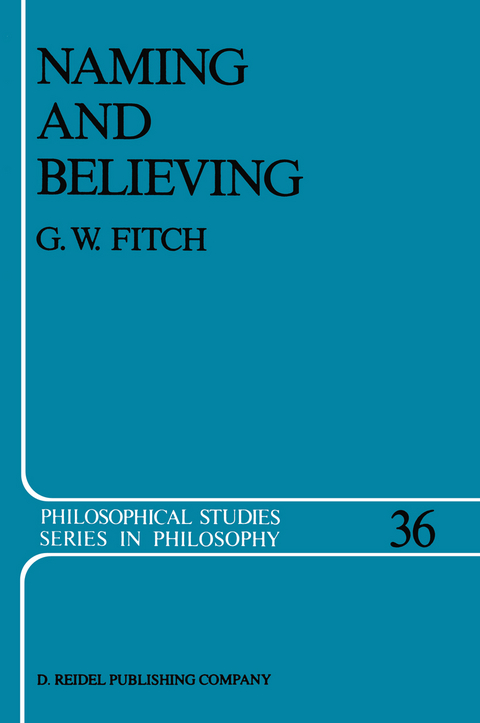
Naming and Believing
Seiten
2011
|
Softcover reprint of the original 1st ed. 1987
Springer (Verlag)
978-94-010-8169-6 (ISBN)
Springer (Verlag)
978-94-010-8169-6 (ISBN)
The relationship between thought, language, and the world is an intimate one. Moreover, it seems as though our ability to have more complex or sophisticated thoughts about the world increases as the complexity of our language or our ability to use the language increases.
The relationship between thought, language, and the world is an intimate one. When we have an idea or thought about the world and we wish to express that idea or thought to others we utter a sentence or make a statement. If the statement correctly describes the world then it is true. Moreover, it seems as though our ability to have more complex or sophisticated thoughts about the world increases as the complexity of our language or our ability to use the language increases. Understanding the complex relationship between language, thought, and the world is one of the central aims of philosophy. This book is an attempt to increase our understanding of this complex relationship by focusing on certain philosophical issues that arise from our ability to refer to objects in the world though the use of language. In particular, it is an attempt to solve the puzzles of reference and belief that Frege and Russell presented within the context of a theory of direct reference for proper names.
The relationship between thought, language, and the world is an intimate one. When we have an idea or thought about the world and we wish to express that idea or thought to others we utter a sentence or make a statement. If the statement correctly describes the world then it is true. Moreover, it seems as though our ability to have more complex or sophisticated thoughts about the world increases as the complexity of our language or our ability to use the language increases. Understanding the complex relationship between language, thought, and the world is one of the central aims of philosophy. This book is an attempt to increase our understanding of this complex relationship by focusing on certain philosophical issues that arise from our ability to refer to objects in the world though the use of language. In particular, it is an attempt to solve the puzzles of reference and belief that Frege and Russell presented within the context of a theory of direct reference for proper names.
1. The Problem.- 2. Beginning Assumptions.- 1 Descriptions.- 1. Indeterminate Descriptions.- 2. The Referential/Attributive Distinction.- 2 Names and Indexicals.- 1. Rigid Designators.- 2. Names and Essences.- 3. Indexicals.- 4. The Meaning of Names.- 3 Singular Propositions.- 1. Propositional Roles.- 2. Propositions and Worlds.- 3. Propositions and Times.- 4. Possible Worlds.- 4 Believing.- 1. Problems with Belief.- 2. Direct and Indirect Attribution.- 3. Two Aspects of Believing.- 4. A Solution to Frege’s Problem.- 5 Empty Names, Semantics, and the A Priori.- 1. Truth Conditions and Propositions.- 2. Empty Names and Beliefs.- 3. Necessary A Posteriori Truths.- 4. Conclusions.- 1. Formal Description.- 2. Remarks.- Notes.- References.
| Reihe/Serie | Philosophical Studies Series ; 36 |
|---|---|
| Zusatzinfo | X, 218 p. |
| Verlagsort | Dordrecht |
| Sprache | englisch |
| Maße | 152 x 229 mm |
| Themenwelt | Sachbuch/Ratgeber ► Natur / Technik ► Garten |
| Schulbuch / Wörterbuch ► Lexikon / Chroniken | |
| Geisteswissenschaften ► Philosophie ► Geschichte der Philosophie | |
| Geisteswissenschaften ► Philosophie ► Sprachphilosophie | |
| ISBN-10 | 94-010-8169-7 / 9401081697 |
| ISBN-13 | 978-94-010-8169-6 / 9789401081696 |
| Zustand | Neuware |
| Haben Sie eine Frage zum Produkt? |
Mehr entdecken
aus dem Bereich
aus dem Bereich
Obst- und Ziergehölze, Stauden, Kübel- und Zimmerpflanzen richtig …
Buch | Hardcover (2023)
Gräfe und Unzer (Verlag)
34,00 €


